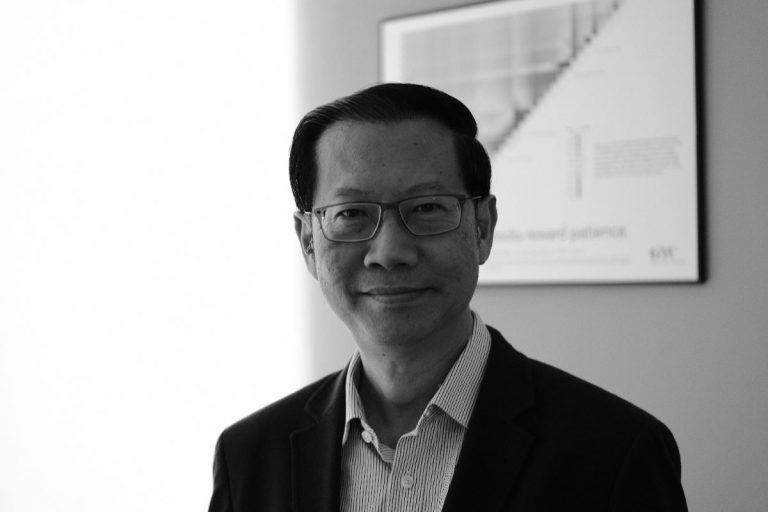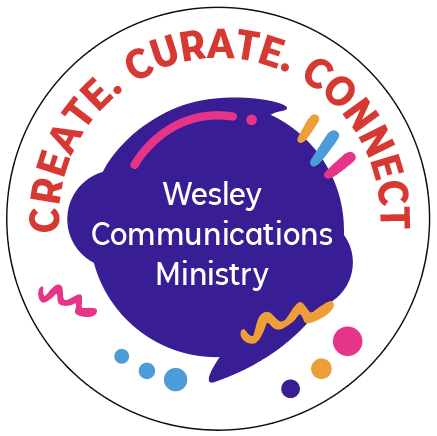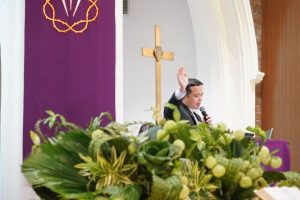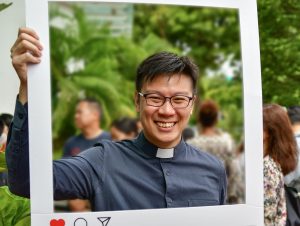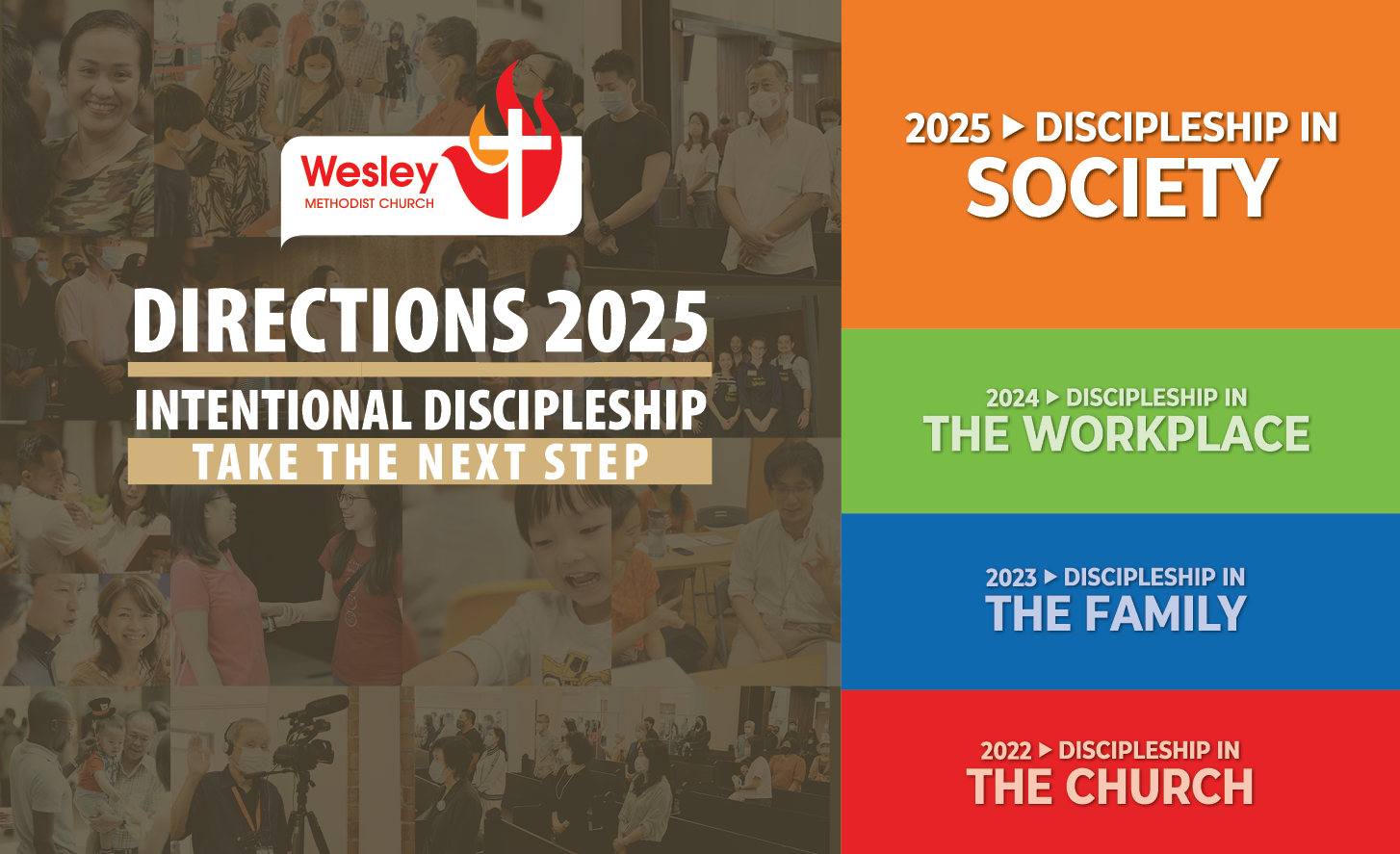At first glance, faith and accumulating wealth can seem incongruous. How can we view wealth and possessions through the Christian lens? What do the Scriptures say about investing? In this part of Everyday Christianity: Faith@Work, Aw Choon Hui, Deputy CEO of a financial advisory firm, shares why investing is beyond accumulating wealth for economic gain alone for ourselves and our families. Choon Hui has been serving in various ministries at Wesley Methodist Church for 37 years. He is currently the Lay Leader and part of the LCEC (Local Church Executive Committee) at Wesley.
Tell us your story, Choon Hui.
I graduated with a Civil & Structural Engineering degree from the National University of Singapore (NUS). My first job was working on the East-West line for the Mass Rapid Transport Corporation (MRTC). I subsequently worked for the Housing & Development Board (HDB) doing structural design for new HDB flats before working for another 14 years as a project manager with a property developer. I made a career switch when I was 42 and joined the finance industry as a licensed financial adviser working in an independent financial advisory firm, where I remain.
My wife, Meng Yin, a school vice principal, and we will be celebrating our 36th wedding anniversary this September. God has blessed us with two children, a daughter-in-law and a delightful 17-month-old grandson.
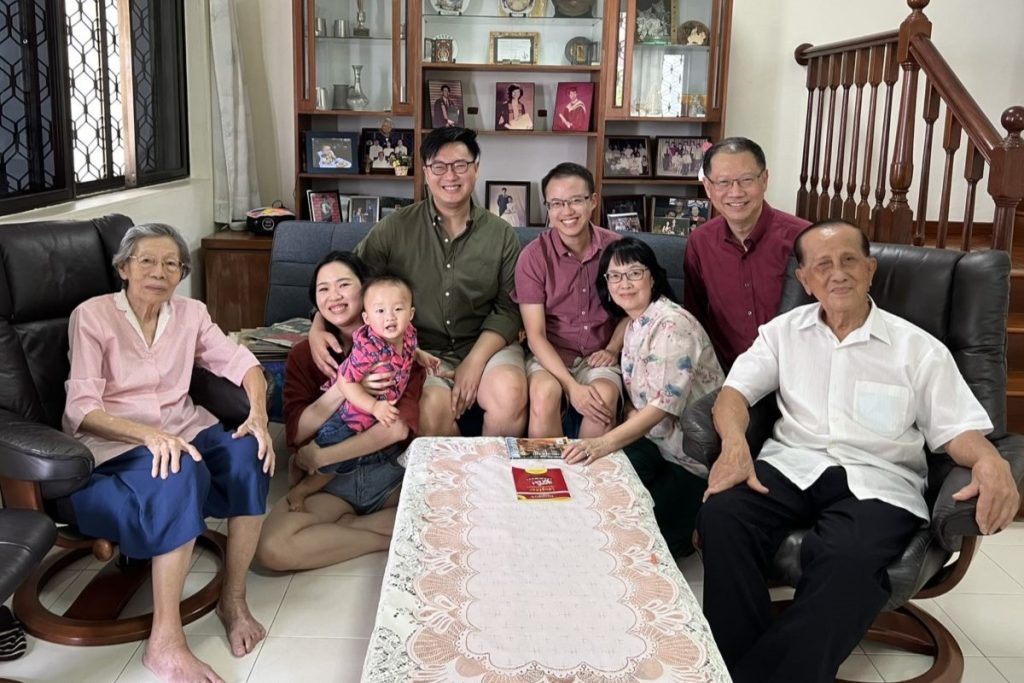
Please share with us how you came to accept Christ as your personal Lord and Saviour.
I remember my mother bringing me to church when I was very young and sitting in the wing of the old sanctuary. My early induction into church life was sitting and drawing at the pews when the pastor was preaching. My mother was a pastor’s daughter, and she brought me along with her whenever she attended church at Wesley. Her father was a pastor for the Chinese-speaking congregation in Malaysia. While there was some Christian influence in my early years, I only accepted Jesus as my Lord in primary school. It happened when I spent my school holidays with my cousins at Changi prison, where my uncle, the late Rev Henry Khoo, was the prison chaplain. One Sunday, my cousins and I sat and played at the back when he was speaking at the prison chapel. I suddenly felt convicted by his sermon, and that night, when everyone was asleep, I invited Jesus into my heart. So you could say that I became a Christian behind bars!
What made you decide to enter the finance industry?
Ever since I started working after graduation, I have been immersed in my work and never had the time to do proper financial planning for my family or serve God in church. A mid-life crisis forced me to reevaluate my life and career trajectory. So, when an old friend invited me to join him in the finance industry, I decided to make this switch. However, I did not expect this to be a permanent move.
Not long after that decision, a friend from Wesley, Winston Tan, invited me to his office. He shared with me a bit of his journey in finance and his insights into the darkness of the industry. Because of the need to deal with money, many have been subverted to compromise their values and integrity. He challenged me to make a difference for God in this industry by relentlessly pursuing truth and integrity in my work. I was immensely grateful for this vision of work he shared with me, even though I was a total novice in the industry and wondered whether I could even measure up. However, his shared vision has remained with me throughout the last 20 years since I made that career switch.
Can you recall an experience, perhaps a valley low or mountain peak moment, that convinced you that God is real in your life?
One of my lowest points was working on a large condominium project in the early 2000s. Due to the late nights and long hours in pushing for the project completion, I suffered a health crisis, which led to surgery and subsequent recuperation at home. Shortly after my operation, my company’s HR staff visited my house to inform me that I did not have to return to work anymore and to submit my resignation as my superiors felt that I had gone for a non-critical medical operation at a critical time of my project. I was devastated and asked God why that happened despite my working so hard to the point of jeopardising my health. In hindsight, this was a pivotal moment when God needed to reset how I lived. I was blind to the hours I put into my work, resulting in me neglecting my family and everything else.
Subsequently, God led me to start a completely new career in the finance industry. Instead of continuing to build on my existing experience in property development, I started from scratch. Amid the painful mid-career transition, I could feel God showing me exactly where He wanted me to be in that phase of my life.
How do you share your faith in your workplace? How can we make a difference in the workplace as a Christian colleague/member where we are?
By God’s grace, many of my current co-workers are Christians, although there are a few pre-believers. At work, I try my best to live out Micah 6:8, “to act justly, love mercy and walk humbly with God and man.” I treat all my colleagues and subordinates fairly and encourage them in my own way. I am mindful that I am a walking testimony for Christ and should not sully His name.
For some time now, I have been praying for the pre-believers in my office and have asked God for opportunities to share the Gospel. I had thought God would provide separate one-on-one opportunities with my pre-believing colleagues. Then, last Christmas, unexpectedly, my boss asked me to share a few words about Christmas during our annual Christmas office lunch. Although impromptu, I did it because I knew God was answering my prayers, just not in the way I expected. At that moment, I could share the central message of Christmas with my colleagues and their families. It made me realise that when God answers prayers, He goes beyond what our human minds can perceive or expect.
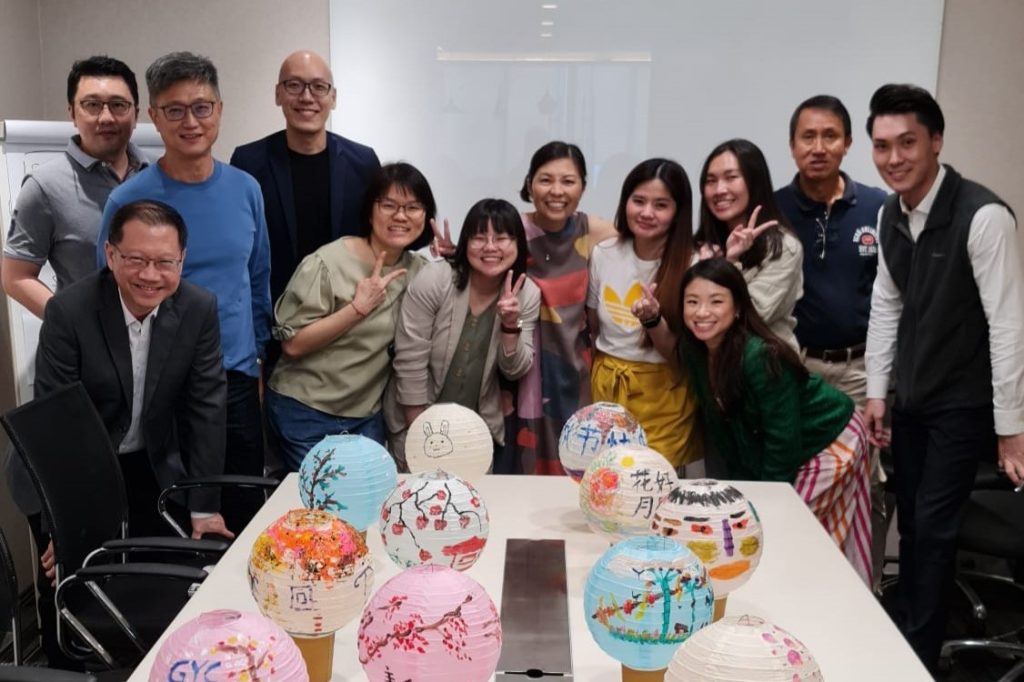
How do you integrate your faith into your career or at the workplace? Please give us an example of how you can apply Christian principles in your job.
What I enjoy about my job is meeting clients and helping them have peace of mind with their finances. I see many who are troubled, and I help them gain a more positive perspective and be less fearful about their finances and future. But I am also very conscious that I cannot do this through my strength alone. So, I try and make it a practice to pause for a few moments to pray in a quiet corner before going for each meeting – for God to be present, to give me wisdom and to say words that bring peace, and to exude His fragrance (2 Corinthians 2:15) to the people I am about to meet.
During the first year of the pandemic, before vaccines were available and when many people were concerned about sudden deaths from COVID-19, we decided to start conversations with clients about planning for their end-of-life. Talking about deaths is a common taboo subject, so we could appear insensitive, especially in a frightening pandemic. However, my team and I were surprised that many people we spoke to were willing to discuss planning for their demise. Many wanted to ensure their wealth was distributed correctly, according to their wishes, by creating wills, trusts, and Lasting Power of Attorney (LPA) instruments. Given the almost daily news of COVID patients being intubated in the ICU, many were also interested in discovering more about their Advanced Care Planning (ACP) and Advanced Medical Directive (AMD) and how their LPA and ACP can help their next of kin (and themselves) should they lose their ability to communicate coherently or become unconscious.
It is particularly meaningful in my line of work to be able to dialogue with families or individuals about different scenarios about their final days and how they could best prepare themselves and their families for what each of us will face one day. While dialogues and discussions require much time and are certainly not a very profitable part of our business, we have found it therapeutic for clients to discuss their end-of-life plans.
Ultimately, our faith needs to permeate all aspects of our life and work. Listening and working through solutions with my clients or friends is congruent with proper stewardship of our earthly resources, especially at the end of our lives when we have to relinquish all our worldly possessions (Psalms 49:17). Through my conversations on end-of-life matters with my clients, potential clients and friends, I hope that many will begin to see that restoring and maintaining relationships with their loved ones is more important than the wealth they possess.
What ethical challenges do you face in your workplace or business?
Over the years, I have found that dealing with money raises many ethical challenges. Some overt challenges are more accessible to spot and overcome, but others are more subtle and less obvious. Being honest and not cheating your customers is a relatively straightforward set of values. However, the asymmetric information in financial markets can be used to take advantage of less financially savvy customers. Market monopolies and the desire to maximise profits cause companies to sell products which – while broadly suitable for the customer – may sometimes only serve the company’s best interests. It is a fine line. It is difficult to avoid such temptations, as doing the right thing may sometimes mean needing more income to put food on the table for one’s family. At such times, the choice to walk the narrow path and continue to trust God for our daily bread might be more challenging.
The industry overtly rewards top salespersons with outsized commissions, incentives, and bonuses to entice many to seek the illusion of wealth and power. However, this road to success can be a cruel taskmaster in many cases, as one must meet ever-increasing KPIs (key performance indicators) to stay employed and in the game.
The industry is also very ingenious at creating products where high fees are sometimes opaque and invisible to the customer. I remember an ex-classmate boasting that because of his favoured status with the bank, he did not have to pay any fees to his private banker—one wonders, then, where the bank gets the money to pay the private banker’s salary. Customers also play a part in the industry’s rewards system. Demanding discounts and free services sometimes results in the salesperson looking for other avenues to get back that same income from the customer. The Scriptures teach us: “You must not muzzle an ox to keep it from eating as it treads out the grain.” And “Those who work deserve their pay” (1 Timothy 5:18). So, all of us can do a small part in not always seeking a win-lose situation, as salespeople also deserve a decent income to support their families.
Over the years, I have been increasingly convinced that it is possible to do good for your customers while still earning a reasonable income in the industry. It is a comfort to know many God-fearing Christians try to do the right thing and practise godly principles in every aspect of their work and business. However, the opportunity cost can be enormous, and one needs to firmly believe that God delights in us when we work with integrity and live out kingdom values. Whether the Lord blesses us materially or not is entirely up to Him. We must trust in His sovereignty and hold fast to His everlasting love for us.
What are your thoughts about God and profits? How can capitalism and Christianity align in today’s world?
In its most fundamental form, money is a tool for exchanging goods and services. Money can do good works; it can also be used for evil. We need much wisdom from God about our wealth and resources and must recognise that our wealth comes from God alone. He intends our resources to be used for good. We need to earn money honestly, try not to harm anyone, and share it generously as God shows us the areas of need around us. We can use our money to bless others so that all glory returns to God alone.
I would encourage our Christian clients to consider stewarding a portion of their wealth for the church or other charitable organisations rather than keeping everything for their immediate families. It is a tangible sign of our gratefulness to God and acknowledgement of our wealth that, regardless of the amount, all come from Him. Recently, I was very blessed to help a Wesleyan church member structure a trust that invests in the financial markets, with the investment returns being utilised in support of our church missions. This generous church member apportions many returns to provide bursaries and scholarships to financially needy students and support other charitable organisations. From the wealth that God has gifted her, she created a self-sustaining investment portfolio with a high probability of supporting her designated beneficiaries, almost perpetually, or until her trust matures in 100 years when she has long returned to God. She can do this because she prefers to live relatively simply. She prefers to keep some of the returns for her living expenses while progressively giving her wealth away. I recall another example of an elderly Christian couple from another church who had saved up quite a significant nest egg by living simply and investing their wealth to receive a monthly income. Instead of spending everything for self-enjoyment, they use about a third of their monthly income to pay for their modest living expenses and give away the remaining two-thirds. They derive boundless joy in seeking opportunities to give each month and have blessed many.
Please share your views about Christians investing in the stock market with us.
First, there is nothing inherently wrong with investing in the stock market. The stock market is a mechanism that allows anyone to invest in a company and share in its profits. As such, it can enable anyone, Christians included, to invest and accumulate funds to meet their financial objectives, e.g. retirement, buying a home for their family, financing tertiary education for children, and extending philanthropic giving beyond one’s earthly life. I had shared earlier how some individuals have invested wisely and used the returns generated to bless so many others, and that was only possible because they could invest in the stock markets. Proper and systematic investing can bring about decent returns, which can help us, our families and others.
I have been blessed with like-minded colleagues, and together, we spend a great deal of time seeking the correct philosophy of investing for our clients, one that is based on financial science and that is sustainable for the long term. While there are many approaches to investing, I have found this approach to be more peaceful, stress-free and more aligned with my own Christian beliefs on investing.
However, as with many things, trading in the stock markets can also be subverted for evil. For example, when one becomes obsessed with seeking wealth through gambling in the stock markets by speculating, frequent trading of stocks based on hot tips to make a quick profit. Throughout history, many have lost fortunes in the stock markets, partly because people foolishly thought they could predict the future or failed to understand and manage the risks associated with investing. Jesus has taught us through the parable of the talents (Matthew 25:14-30) that we must be proper stewards of whatever resources we have been entrusted with, to multiply them for our Master and King responsibly!
Well, you have a lot on your plate, Choon Hui. How do you keep your Sabbath and find rest in God as you labour hard in your work? Can you even rest?
I must admit that I still struggle quite a bit with finding regular rest in God. With more work, church and family responsibilities this season, I find scheduling Sunday rest time harder due to frequent interruptions and a never-ending to-do list. Sundays have been reserved for attending church and taking care of my grandson. More than anything, we want God’s will to be done in our children and their children’s lives. And so, I try to pray as often as possible for my children and grandson that they will always be close to God and seek Him till the end of their days. My wife and I also try to squeeze some time on Sundays to visit my parents and get a meal for them, as they do not live with me. Often, we bring our grandson along, as I see that it brings them joy to see their great-grandson.
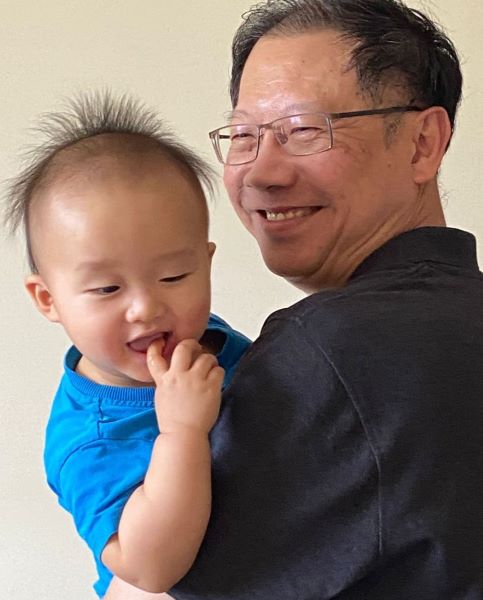
I remember Pastor Raymond Fong’s sharing that although we may not be physically resting during such times, we should still try to have a different rhythm from workdays and, thus, let our minds and bodies take a break from the regular work rhythm. So, I keep a different rhythm on Sundays.
Finally, Choon Hui, how have you seen God work in your life so far?
My career trajectory was not strictly linear, but it has gone far beyond what I imagined when I started as a young engineer toiling on the MRT line. The same is true of my family and church life.
Throughout my life, there were times when I lost faith and purpose. But in each instance, God always proved faithful and kept me steady. From the Psalmist’s words, “Your eyes saw my unformed body; all the days ordained for me were written in your book before one of them came to be” (Psalm 139:16). I derive comfort knowing that a loving God already knows all my days and desires that I trust Him for what I cannot see. Despite severe crises in my family life, whenever I cried out to God, He has carried me through each storm I faced. I learnt over the years how it is possible to serve God despite being busy at work. I confess that whenever I have been called to serve, I hesitate, giving excuses like not having enough time to fit in with my busy workload, time with family and time for rest. But whenever I decided to answer the call as an act of obedience and gratitude to God, He always mysteriously gave me the additional capacity I needed to fulfil my responsibilities. I believe this is to show that everything is only possible by God’s grace and power and not by my strength, lest I should boast. Indeed, God honours those who honour Him (1 Samuel 3:20).
I have found that through serving God, I have drawn closer to Him, which is one of the most tremendous benefits I have derived. Service is not always easy, and many times, I felt overwhelmed. But when I surrendered everything to Him, He showed me small miracles. I pray and trust that day by day, He is making me a better husband, father, grandfather, son, brother, work colleague and follower of Christ. I have seen that He can accomplish so much more through me when my life is wholly yielded to Him.
Photos courtesy of Aw Choon Hui
For more perspectives by Choon Hui about Work-Life Integration, please tune in to this episode of ‘Workplace Conversations’ podcast on Spotify moderated by Rev Raymond Fong and featuring Choon Hui, Cheryl Seow and Andrew Ng: Workplace Conversations: Work-Life Integration – Wesley Podcast | Podcast on Spotify
(You do not need a Spotify account to listen to this podcast)
Read also: ‘Life is not a competition but a race’: An Interview with Stephen Chia, a full-time Christian Ministry worker; ‘The more I know about the complexities of the human body, the more I appreciate the intelligent design and mortality of humankind’: An Interview with Dr Lennard Chan
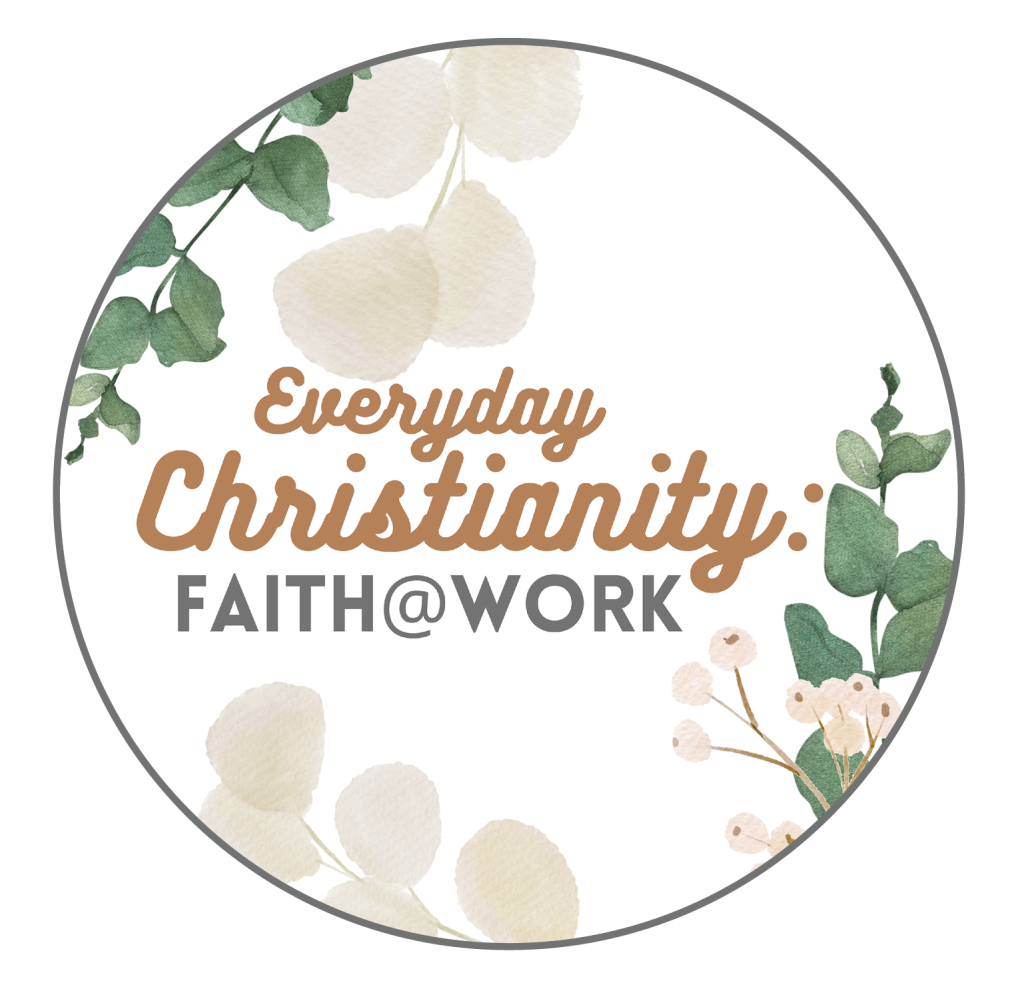
Everyday Christianity: Faith@Work is an interview series with Wesleyans from diverse age groups and walks of life. In this series, published in conjunction with our church’s theme for 2024 – Directions 2024: Discipleship in the Workplace , we hope to discover more about the perspectives of Wesleyans in different vocations on how they live out their faith every day, specifically in their workplaces, homes, or communities where they serve. More than just stories of success in victory, we also want to hear their stories of perseverance that point to the reality that our Father is a living God who is ever present in the mountain peaks and valley lows of our everyday lives. For more on Workplace Conversations, please listen to our podcasts by Rev Raymond Fong at Wesley Podcast • A podcast on Spotify for Podcasters .

